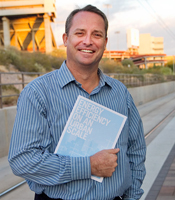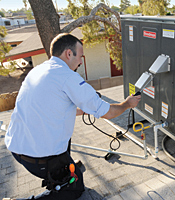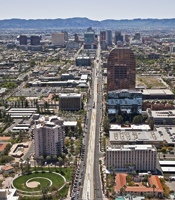|
November 30, 2011
Dear Board Member,
|
| |
|
This month we introduce Mick Dalrymple, a leader in the green building movement and manager of ASU’s Energize Phoenix project. On page two you will find our monthly briefing on recent sustainability news and activities.
|
| |
|
|
Q&A with Mick Dalrymple
Implementing energy efficiency on an urban scale
|
|
|
|
Mick Dalrymple is the ASU project manager for Energize Phoenix, a $25 million federally funded program to upgrade the downtown Phoenix core for significant energy savings. He cofounded the Arizona chapter of the U.S. Green Building Council, served two terms on USGBC’s national board, and is a LEED Accredited Professional in both the Building Design & Construction and the Homes rating systems. Dalrymple is a graduate of the Thunderbird School of Global Management and ASU’s MBA program and has founded or cofounded three companies: a.k.a. Green Environmental Building Supplies, a.k.a. Green Services, and Desert Moon Productions. He also contributed to development of the ICC-700 National Green Building Standard.
|
|
|
How did sustainability become part of your career?
My career in sustainability was triggered by the release of the National Energy Policy plan in 2001, which depended heavily on continuing use of fossil fuels. Having grown up in a military family, I knew this plan would ultimately result in more U.S. troops being deployed to protect our energy interests abroad. As a former lobbyist for Arizona’s university students, I understood that change results from involvement. So I began working with others to create more sustainable solutions.
|
|
|
What is your most important sustainability-related project right now?
Energize Phoenix is a three-year incentive and education program focused on reducing energy waste in buildings. Energy efficiency is our single cheapest source of available “new” energy. Reducing wasted energy not only makes our businesses more competitive and our households more resilient, but it also reduces environmental impacts and reliance on other countries. Our goal is to trigger a substantial number of energy retrofits of homes and buildings and create a culture of energy efficiency along a ten-mile stretch of Phoenix’s light rail system. Such upgrades lowered energy consumption in my own home by 75 percent. The potential is enormous.
|
|
|
How will your work make a difference?
It is still early, but Energize Phoenix is already producing savings in 74 buildings and 302 apartments, while also providing lessons learned for the rapidly growing energy efficiency industry. In addition, our numerous lines of research will boost results for current and future energy efficiency programs. Our socio-behavioral research, for example, should improve the targeting of market-based energy efficiency programs. Meanwhile, our engineering research is working to increase the energy savings achieved through retrofits. And our economics research is tracking the energy and economic impacts of this program structure. We are also making a concerted effort to communicate research results to 40 other related programs across the country and to the U.S. Department of Energy. |
|
|
What is the world sustainability challenge that concerns you most?
It’s the human issue. We have many sustainable solutions available that are not being implemented because we refuse to accept responsibility and deal with the problems we have created. We know the planet itself will go on regardless of what we do. We must collectively decide whether we value each other and our children enough to stay on board for the ride.
|
|
|
Note: The first year report on Energize Phoenix – Energy Efficiency on an Urban Scale – is available at energize.asu.edu.
|
|
|
|
|

Mick Dalrymple
|
|
|

Duct sealing, air sealing, and HVAC replacement are three of the most effective residential energy upgrades.
|
|
|

The Energize Phoenix Corridor is a diverse area centered on the city’s Metro Light Rail.
|
|
|
|
|

|
|
|
Highlights of ASU sustainability activities
|
| |
- Four ASU Sustainability Scientists are profiled in The Atlantic as part of the magazine’s series of conversations with experts on sustainability and other subjects. The series, “Nine and a half questions,” interviews three teaching faculty at the School of Sustainability: Kevin Dooley, academic director at The Sustainability Consortium; Christopher Wharton, assistant professor at the College of Nursing and Health Innovation; and Quentin Wheeler, professor at the School of Life Sciences. Also profiled is Bruce Rittmann, director of the Swette Center for Environmental Biotechnology at ASU’s Biodesign Institute.
Read Dooley » | Read Wharton » | Read Wheeler » | Read Rittmann »
|
| |
- ASU has launched a “10,000 solutions” website to invite students and the world community to collaborate on ways to reach sustainability and solve other global and local challenges. Ideas are submitted via online posts, videos, and images. Participants can also comment on proposed solutions and help refine them. Top solutions may win prizes up to $10,000.
Read more »
|
| |
- A study in the journal Science led by the Global Institute of Sustainability’s chief research strategist, Ann Kinzig, assesses the promise and pitfalls of mechanisms to pay for public ecosystem services. Kinzig and her colleagues find that most of these services, such as habitat provision and climate regulation, need the protection of a payment system. Poorly thought out mechanisms, however, are worse than nothing, so the study provides guidelines for effective payments. Co-authors of the report include Sustainability Scientists Charles Perrings, Kerry Smith, and B.L. Turner II, plus experts from University of Minnesota and University of Alaska.
Read more »
|
| |
- ASU is among a “founding circle” of universities enlisted to develop the Billion Dollar Green Challenge, an initiative led by the Sustainable Endowments Institute to help nonprofit universities finance their energy efficiency upgrades through green revolving funds. Other participants include Harvard, Stanford, and the University of British Columbia. The initiative is intended to cut greenhouse gas emissions at universities and reduce operating expenses to free up funds for future projects.
Read more »
|
| |
- Two industry awards highlight ASU’s leadership in sustainable procurement practices and solar energy deployment. Supply and Demand Chain Executive magazine gave ASU a 2011 Green Supply Chain Award for advancing sustainability in the university’s purchasing strategy. The Solar Electric Power Association named ASU its 2011 Solar Partner of the Year for both adopting solar energy and also improving efficiency and reporting. The solar award was presented in conjunction with Solar Power International 2011, the largest solar power trade show in North America.
Read Supply Chain » | Read Solar »
|
| |
- One of the first ASU undergraduates to earn a degree in sustainability tells the Phoenix Business Journal he has never had a problem finding jobs since his 2009 graduation. Andrew Krause is now chief process officer for a solar consulting firm, while also pursuing a master’s degree in the School of Sustainability and counseling others on how to find jobs in the solar field.
Read more »
|
| |
|
Please feel free to email or call us with any questions or comments about this briefing.
Best regards,
|
| |
|
|
|
PS: We will save December news for the January letter to reduce your holiday season correspondence.
|
|










